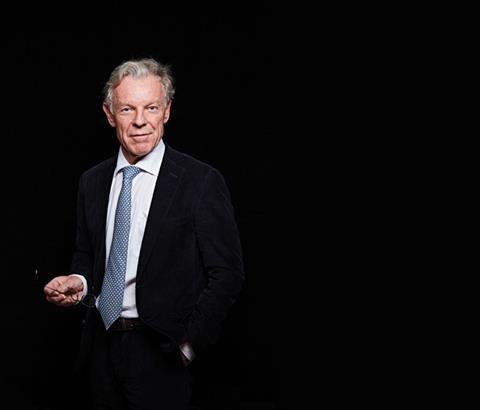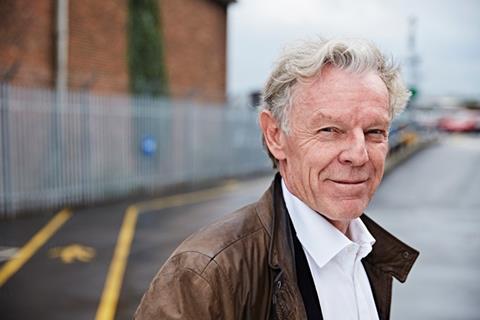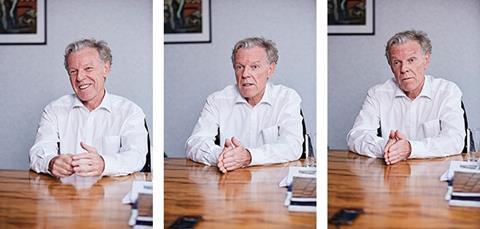In 2014, Bruno Dupety was brought in to sort out Vinci’s UK construction arm: managing some massive project losses, refreshing the leadership team and restructuring struggling parts of the business. But he also has his eyes on higher peaks, he tells Dave Rogers. Photography by Tom Campbell

When you think of a chief executive, an image may pop into your head of a sedentary German car-driving man (usually a man) whose main hobby is golf.
Perhaps that’s a little unfair – although in a recent interview Balfour Beatty boss Leo Quinn did reveal a liking for BMWs and the odd round on the links. Certainly what you don’t expect is a chief executive who turns up to client meetings on his bike, and spends his leisure time planning to scale an 8,000m Himalayan mountain.
But that’s what Bruno Dupety, the chief executive of Vinci’s UK arm, Vinci Construction UK, does.
Last year, Dupety was ice climbing on Ben Nevis, going up a gully called Point Five – which many mountaineers consider to be one of the hardest in the world, with a top grade rating of V, indicating its difficulty. He tells a story that 100m below the summit the going got incredibly hard and there was nothing for him and his climbing mates to fix their ice screws into. “The drop was 500m.” He makes a noise with his mouth, to mimic a fall. “If for any reason … that was the end. That was very scary. When you’re in that situation, you’re very focused on what you do.”
The 60-year-old Frenchman has had to apply that same focus to his present job, after being parachuted into the role more than two years ago by Xavier Huillard, the Paris-based chairman and chief executive of the €38.5bn (£33bn) turnover Vinci group. He had quite the challenge to overcome that time, too.
Man with a plan
When Dupety arrived in England back in October 2014, the UK part of the firm was preparing to announce massive losses on a number of schemes, especially its deal to expand the tram network in Nottingham.
Dupety says the scheme is expected to see total losses come in above £150m and edge towards £200m. “We signed a bad contract and we didn’t have the right people to manage this contract,” he says. “Honestly, we didn’t understand the difficulty of the project – 17km of track in a city where you have to do everything and have the agreement of every stakeholder. It’s impossible.”
We should promote the industry, make young people dream. In France, construction isn’t the last choice of the engineering student
Signed in 2011, the deal Vinci struck was to double the existing network, which had originally been built by Carillion seven years earlier. Vinci’s bit has been operating for nearly two years now but the firm still has to come to a final settlement with the scheme’s ultimate client, the city council. Dupety wants the job out of his hair this year. “When you finish a job, you need to sort out everything. It will take a while but 2017 we need to finish all that stuff,” he says.
He wants to emphasise that this sort of contract is a blip. “It’s an accident, forget it. Nottingham is an accident.” Asked how a firm manages to lose the sort of sums Nottingham has haemorrhaged, he replies: “If I had the answer, I would tell you. I don’t know. When you start losing, it’s always getting worse.”
When he arrived at the UK business, Dupety was shocked by what he found. “There were two parts in the company. One part was good, one part was totally out of control.”
He lists the bits that were doing OK: development, FM, the north building division and the civils business of its Taylor Woodrow arm, whose name Vinci has retained since buying it nine years ago. “But there was the building division in the south, which was not operating efficiently. It was not good. They took projects at very low prices and then the subcontractors’ prices went up. We were squeezed between low prices and escalating costs. I had to change and restructure the team.”

There were two parts in the [UK] company. one part was good, one part was totally out of control
Casualties included UK managing director Andrew Ridley-Barker, commercial director Paul Tuplin and John Stanion, a 22-year veteran of the firm, who Huillard brought Dupety in to directly replace. When Dupety joined, the firm said Stanion had retired “with immediate effect”.
Dupety’s turnaround plan – which he has dubbed 1-2-3 – seems to be working. In 2014 and the following year, the UK construction business racked up aggregate losses of close to £290m. When it files its 2016 results at Companies House, the firm will post a small profit on a turnover of close to £1bn, giving it a margin of 1%. That would mean profit after tax would be around £10m.
That is the first bit of the 1-2-3 plan – so-called because of its aim to get margins up from 1% to an eventual 3% – sorted but, unlike ISG’s chief executive Paul Cossell, who last month said contractors should be aiming for margins of 5%, Dupety says 1-2% is the best most can hope for – 3% would be rare. Is that somewhat pessimistic?
He’s just being realistic, he says. The UK construction market, he reckons, is one of the most difficult in the world. “When you are a main contractor, the trend from the client is to push all the risk onto the shoulders of the main contractor. The acceptability of the market in terms of profit in our business is quite low.”
He says clients in France, home of Vinci UK’s parent company, are more willing to accept margins of the kind ISG’s Cossell thinks are achievable but adds: “If I said in France, you can make 10% they’d say ‘you’re crazy’. Asking for 5% [in the UK] is the same in my view.”
The right people
Before coming over to the UK (and Vinci UK’s main base is, some might think, a rather unglamorous trading estate in Watford for part of a €38m turnover business) Dupety was put in charge of the merger of Vinci subsidiary Freyssinet, a structural and civil engineer that worked on Cardiff’s Principality Stadiu, and geotechnical specialist Bachy Soletanche in 2009, with the enlarged business posting revenue of €3.2bn (£2.8bn) in 2015.
It was then on to the UK, which is Vinci’s biggest market after France and Germany. Dupety’s international experience perhaps helps him see this country’s issues more clearly.
UK construction’s profit problem, he says, is tied up with its image problem. A civil engineer by background, who completed a masters in engineering at Berkeley in California, he says: “In the UK, this industry doesn’t attract the best students. In France, it’s not the same. In France, you have very good students who go into construction. Here, the good students want to go to finance, law. We should promote the industry, make young people dream. When you see what we are doing it’s an achievement – a tower in London, bridges, tunnelling on Crossrail. In France, construction isn’t the last choice of the engineering student.”
A frenchman in london
Like many living in London – his home is in Marylebone – Dupety was surprised by Brexit. “When you’re in London, you think this country is doing very well. This is the place to be if you compare it to France. Everything was OK and suddenly [he whistles].” For him the vote to leave was about immigration. “What I am struggling to understand is such an open country voting for Brexit for immigration purposes. In the UK you have probably the most efficient immigration. There is no problem if you compare it to France. Here it is very smooth.”
It’s a problem that might get worse with Brexit. After last year’s referendum, Dupety, who was heading to Europe on the Eurostar as Nigel Farage was clearing his throat for his victory speech that June morning, checked to see how much overseas labour was on his sites. It came in around 30% but he says a number of trades – concrete frames and steel fixing – are heavily dependent on eastern European labour. Brexit hasn’t given him too many headaches – yet – but he sees problems for the industry in years to come. “Who in this country at the age of 15 or 16 wants to pour concrete?”
He certainly doesn’t foresee EU nationals heading home in droves. After the Brexit vote, he spoke to a managing director at Vinci’s subsidiary in Poland. “I asked: ‘Will they go back to Poland?’ and he said no because the wages are less in Poland.”
He says what firms now need is for Theresa May’s government to stick to its big-ticket infrastructure and housing pledges. “HS2 should go ahead. The industry needs a little bit more visibility ahead. When you have visibility you can be more efficient.”

The next steps
Dupety is clearly keen to keep close tabs on the business that he has shored up. He visits sites once a week and is known for being hands-on. Last year he was at the AC/DC concert at the London stadium to see for himself how his team, which has a 25-year deal to look after the venue, was doing. And he recently held a board meeting at the London home of the ICE, which Vinci’s FM arm was at the time refurbishing.
In terms of strategy, Dupety says he is happy with a turnover of around £1bn and has no real plans to increase its share of the London building market, which is limited to the New Covent Garden market mixed-use scheme and expanding Chase Farm hospital in north London. Its other schemes in the capital are mainly civils such as the Victoria station upgrade and Crossrail, where it is working on tunnels and building a new station at Whitechapel.
The firm was making “big losses in London” a few years ago and Dupety doesn’t want to revisit that. Building in the regions such as the North is less risky while Dupety also moved to head off more headaches by shutting a UK operation that was bidding for work in the Middle East. “This particular market is quite difficult so I decided to stop it.”
Dupety’s time so far in the UK has no doubt been shaped by the problems at Nottingham – he refers to it more than once as an “accident” – and for him “fixing” the UK business means one thing. “Our priority is to have a sustainable construction business, to show that we are not going to suffer anymore,” he says. “We had a problem and the chairman asked me to come and fix it.” By the looks of it, he has.
Up and up
Bruno Dupety discovered his love of climbing when studying civil engineering at university in Paris. A native of Burgundy, he has climbed all over the world.
Mont Blanc has been ticked off a number of times – he has even skied off the top of it – while he has climbed one of the great north faces in the Alps: the 4,208m Grandes Jorasses on the France-Italy border. Known for their difficulty and height, the north faces include perhaps the most notorious – the Eiger in Switzerland – which Dupety is eyeing. “Maybe,” he says. “It has to be done when it’s frozen because of the rockfalls.” Also, on his radar is the 8,201m peak Cho Oyu in the Himalayas.
More immediate is an attempt on the Half Dome in Yosemite Valley in California, which rises 1,444m up a sheer face of rock. “I’ve always dreamt about Half Dome since I was young,” Dupety says. Closer to home he climbs every week at indoor centres and goes climbing in Wales and the Peak District. “You need to be light. It’s better to be light than strong.”
Does he ever get summit fever, the condition which can see mountaineers, pushing for the top, overstep their capabilities with sometimes fatal consequences? He goes back to the time he was on an unclimbed 6,000m peak in Pakistan a few years ago. “We were maybe 100m from the top and I said to my guide: ‘please, if you want to go to the top, that’s fine’.” Giving up the chance to be first on the summit, instead he turned around and headed down.


























No comments yet